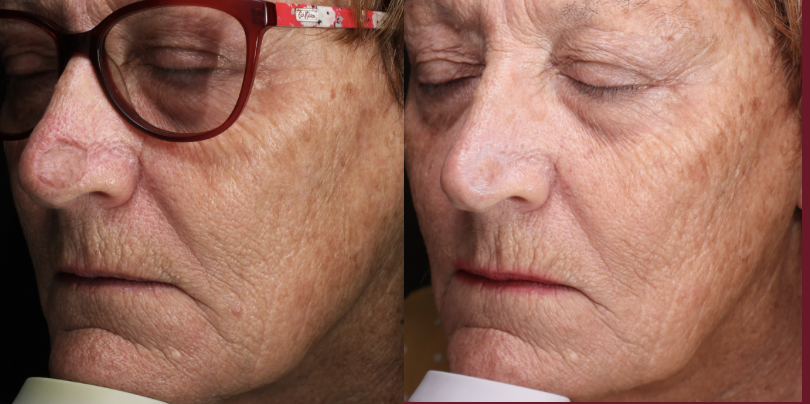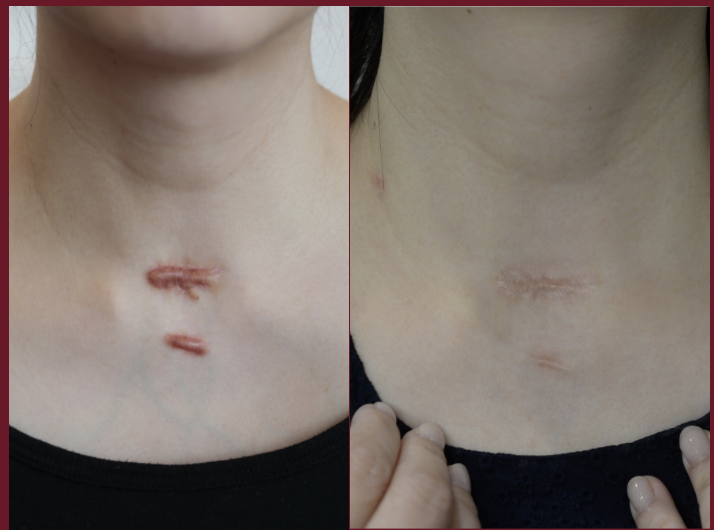Scar Treatment & Prevention
Results vary between individuals. Images are of patients treated by Dr Nina Wines and are published with their consent. These are for illustrative purposes and are not a guarantee of results
Scarring can significantly impact confidence, function, and quality of life. Dr Nina subspecialty interest is in scar management. Through the Scar Clinic at her practice, she offers a structured, medically-led approach based on the latest global evidence.
Whether you're navigating a new surgical scar, struggling with acne scarring, or want to minimise the impact of trauma-related skin damage, you’ll benefit from her:
Close to 20 years of dermatology experience
Access to every major wavelength of laser and energy-based device
Involvement in global scar conferences and contribution to national and international teaching
Tailored protocols based on scar type, location, and skin characteristics
Types of Scars Treated
Surgical scars – incisions, C-sections, joint replacements, and more
Acne scars – atrophic, boxcar, rolling, or mixed
Hypertrophic scars – raised, thickened scars confined to the injury site
Keloid scars – dense scars that extend beyond the wound
Traumatic scars – from accidents, lacerations, or burns
Contracture scars – typically after burns, limiting movement
Stretch marks – treated with regenerative and collagen-boosting methods
Scar Prevention: Timing is Key
Scar prevention is often more effective than scar correction. Dr Wines collaborates with surgeons to treat patients as early as possible after surgery
Early laser intervention, particularly fractional ombined with vascular lasers and drug delivery, can:
Remodel collagen while it’s still forming
Reduce risk of thick or discoloured scars
Improve functional and cosmetic outcomes
She follows 2020 international consensus guidelines recommending early laser-assisted scar intervention wherever possible.
Scar Treatment Protocols
No single treatment works for all scars. Dr Wines uses a combination of advanced technologies in each single session:
1. Fractional Laser Resurfacing
For texture, thickness, and atrophic scars
2. Vascular Lasers
To reduce redness, vascularity, and inflammation
3. Laser-Assisted Drug Delivery (LADD)
Enhances the penetration of corticosteroids or topical agents
Excellent for hypertrophic scars and keloids
4. Surgical Scar Revision + Laser
For deep or irregular scars
Combination approach planned on a case-by-case basis
5. Regenerative Therapies
PRP, skin boosters, and medical-grade skincare are sometimes used
Each protocol is tailored to the type of scar, your skin tone, healing stage, and personal goals. Rarely is a single treatment alone effective. Multiple techniques combing laser and medical therapy are required for effective results.
FAQs
Q: When should I start treating a scar?
A: Ideally as soon as the wound has closed or sutures are removed. The earlier the intervention, the better the outcome.
Q: Can old scars be improved?
A: Yes. While prevention is ideal, even longstanding scars can benefit from combined laser therapies and medical management.
Q: How many treatments will I need?
A: It depends on the scar type. Surgical scars may respond after 2–3 sessions, while acne scars often require a series of 3–6 treatments.
Q: Is laser scar treatment safe for darker skin?
A: Yes—with experience. Dr Wines is trained in treating skin of colour and carefully selects safe wavelengths and settings.
Before & After
L
Learn more about scar treatment with Dr Wines - phone 02 9958 1555 or email info@drninawines.com
All medical and laser procedures carry some risks. The information provided here is general in nature and not a substitute for a professional medical consultation. For advice tailored to your skin and health, please book an appointment with Dr Nina Wines.




